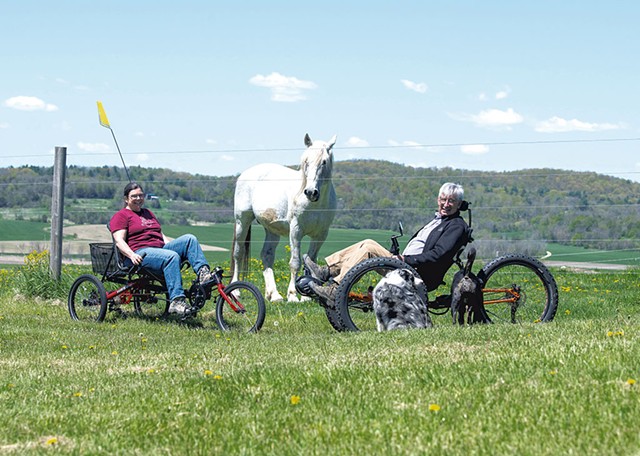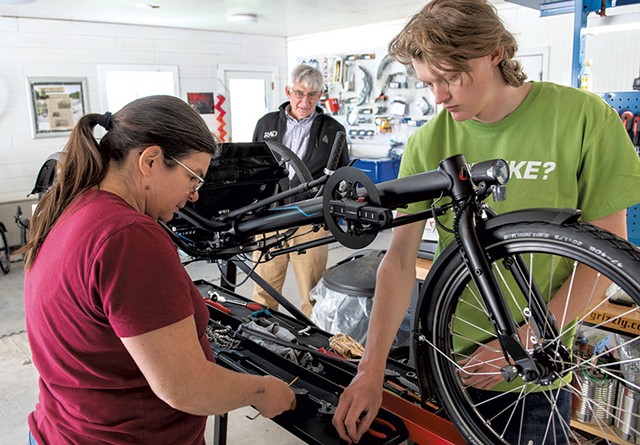
- Caleb Kenna
- Anja Wrede and David Black
Avenir Farms is much like hundreds of others in Vermont: a barn, horses grazing, a scatter of outbuildings, free-ranging dogs and chickens, a vista of broad fields. And a UPS truck unloading high-tech bikes from Europe?
As I turned onto the winding drive off Route 125 in Cornwall, the juxtaposition was like seeing a satellite dish in some bucolic Pieter Bruegel painting.
My companion in the SUV was a recumbent trike, badly in need of a tune-up and minor maintenance. A search for qualified recumbent bike techs led me to Anja Wrede, 51, a native of the former East Germany who now operates a shop three miles southwest of Middlebury.
What I did not know was that Avenir is the Northeast epicenter of adaptive cycling — customizing bikes for people with disabilities.
Recumbent bikes are the lowriders of cycling. Often called "bents"— not always affectionately — they are sometimes derided by upright, and uptight, cyclists. Bent riders appear laid-back, sitting up with legs stretched out in front, as if pedaling a swan boat in the Boston Public Garden. Trikes — three-wheeled recumbents — are the Frankenbikes of the breed and the preferred archetype for adaptives.
In addition to being the distributors of high-end German-made Hase recumbents, Wrede and partner David Black, 67, an engineer-cum-horse breeder-cum-marketing guru, run RAD-Innovations, the leading custom design-and-build firm in the burgeoning business of adaptive cycling.
Adaptive bikes assume many different configurations with the same purpose: enabling disabled people — creating mobility for individuals who have little or none. These are bikes that can be operated by hand, or with no hands, or with one leg, or with electric assist — there are even bikes without pedals called RaceRunners. In short, there are bikes for all abilities, bikes that roll with the rider's capacity.
With my tune-up I got an education. Wrede, who learned bike building from a friend in Potsdam, Germany, in exchange for helping him renovate a kitchen, said the thrill of enabling someone to do something previously denied them never gets old.
"It's a really amazing feeling to give that person the knowledge and a way to do what they thought they can't do," Wrede said. "It makes me really happy and proud to be the person that makes it possible."
Horses, not bikes, had been Black's primary riding interest; he'd begun taking horses out as a teenager in East Africa, where his father, an agricultural economist, was serving with the Peace Corps. Black began his adult working life as an engineer. Eventually, though, he turned most of his attention to breeding and training sporty Dutch Warmbloods for dressage on a farm in Washington State.
In the 1990s, Black also began work on a project to develop adult pushchairs and running strollers, which morphed into more sophisticated mobility machines as he recognized the need.
Meantime, after her kitchen barter, Wrede followed her cycling passion. She became a certified mechanic and, in 1992, opened her own bike shop in Potsdam. From there she moved to Cologne, Germany, where she managed a company that manufactured tandem bikes. A number of Wrede's customers in Germany were blind and needed their bikes adapted.
In 1999, when a project involving strollers for children with disabilities brought her into Black's orbit, the gravitational pull was irresistible.
Wrede moved to the U.S., and the couple married. They founded RAD-Innovations in 2004 in Washington and ran both the horse and bike businesses from his farm. At one point, Black had a herd of 60 Dutch Warmbloods that he sold to riders who competed internationally.
After doing some research, the couple decided they needed a location with better transportation and easy access to shipping services. In the 1970s, Black had lived and worked in Vermont's Orange County as an engineer when the horse-breeding business drew him out west and eventually to Washington. Now, good memories of life in Vermont tipped the relocation scales in favor of the Northeast.

- Caleb Kenna
- From left: Anja Wrede, David Black and Tom Hussey
So, in 2012, the couple moved east and purchased a 47-acre former dairy farm in the Lemon Fair valley of Addison County. They named it Avenir, after one of Black's first stallions, and set about restoring some buildings. They turned one into a guesthouse for customers who were being fitted for bikes.
Wrede said she found Vermont more like Europe. "People seem to have a different understanding than on the West Coast," she said. "As a German person, it feels much more like home. Vermont has people that care for each other. It's really easy to deal with people in the Northeast."
"Our goals are to renovate the existing structures, revitalize the fields to productivity, and make the farm self-sustaining as a homestead and for the livestock we raise," Black said, "and a refuge for the area's wildlife." In addition, he's still training seven horses.
Along with Hase bikes, which arrive regularly on that UPS truck, the two build and fit all manner of specialty bents for customers.
"Most all of the bikes ... have the ability to be adjusted to a broad spectrum of sizes and weight, whether it's a height and weight issue or conditions and range of motion," Wrede explained. "It could be a stiff knee; it could be a missing leg." She estimated that RAD-Innovations sells about 300 bikes annually.
One of those bikes is helping James Cornett fly again. But not the F-16s he piloted over Iraq during two tours of duty in the U.S. Air Force, beginning in 2006. In March, Cornett steered a fat-tire ICE (Inspired Cycle Engineering) recumbent borrowed from RAD-Innovations around the Rikert Nordic Center in Ripton. For the first time since an accident that injured his spine, he felt that old thrill — and no pain.
"It gave me the closest realization to flying, because of the freedom on that bike standing on the earth ... It was amazing," said Cornett, 42. "For the first time since my injury, I was able to do something physically active that didn't hurt me any more than I already hurt. You couldn't even imagine the smile and the joy that it brought to my face."
Cornett said he was just 7 years old when he knew he was going to be a fighter pilot. "There were a couple times where I tried to walk away from it, and the universe kind of said, 'Nope, this is who you are and what you're going to do,'" he said.
"That was my career, and I ... was exceptional at it. I loved it; it brought me joy that was beyond words," Cornett continued.
A freak accident on the ground back at base after a particularly hairy mission left Cornett with excruciating pain in his arms and legs and recurring numbness in his hands. It went misdiagnosed for years. He tried flying with the pain, but it was unbearable. Finally, doctors discovered he'd suffered multiple herniated discs, nerve damage and a traumatic brain injury.
"My career was ripped from me," Cornett said.
Grounded, he was sent home to Lincoln, Vt., with a medical retirement, financial security and pain so pervasive that he couldn't even hack yoga. He went from being extremely active to virtually dormant.
Cornett said he attempted an old passion — cross-country skiing — but the pain in his arms and hands was acute. He spent part of the winter in the Florida Keys, where he could tolerate walking. When he returned to Vermont, Cornett was determined to find a way to get out with Emma, his 13-year-old daughter, who loves riding her bike. That's when he discovered RAD-Innovations.
"I started doing a little bit of research and saw the recumbent bikes on the RAD site, and I felt like this might be the way, because my legs work," Cornett recalled. "And if maybe leaning back in a seat where all the weight and the pressure is taken off [would help]."
He rang up Black, who offered to test and fit him at Avenir Farms. The ex-pilot was fitted with an ICE trike, which was equipped with an electric-assist motor.
"It really responded like I was in a plane," Cornett said.
Then Black and Wrede took him to Rikert and let him bomb around the trails. Cornett was in love.
"And then they told me about the VA program, which I had no idea existed," he said.
Black put Cornett in touch with Jennifer Stark, a specialist working in the Recreation Therapy Service at the Department of Veterans Affairs in White River Junction.
"He was so excited when I talked to him," Stark said of Cornett. "It's not common that a vet will contact me and say he's found a bike. A lot of times the vet won't take the initiative. I just said, 'Let's do this; we'll figure it out.'" Stark said she would submit a proposal under the recreational therapy program to fund a trike for Cornett.
Recumbent trikes are not for the faint of wallet — they can cost from $2,000 to nearly $10,000 with electric assist. Custom adaptive bikes can exceed that range. According to the Vermont VA, RAD-Innovations has provided five vets access to adaptive cycles over the past year. The company delivers 50 to 60 adaptive bikes to the VA nationally each year, Black said.
Stark was optimistic that she would get Cornett "flying" again.
Back at Avenir Farms, I couldn't leave without asking about the sense of dissociation that had hit me when I drove in. Wrede smiled.
"You know, a lot of people are very cautious when they come in," she said. "They say, 'Are we in the right place?' And then quickly they warm up when they see everything, and they feel right at home. You know, they go and want to see the chickens and the geese and the horses.
"They have a mini vacation," Wrede said, "and then we make them a bike."










Comments
Comments are closed.
From 2014-2020, Seven Days allowed readers to comment on all stories posted on our website. While we've appreciated the suggestions and insights, right now Seven Days is prioritizing our core mission — producing high-quality, responsible local journalism — over moderating online debates between readers.
To criticize, correct or praise our reporting, please send us a letter to the editor or send us a tip. We’ll check it out and report the results.
Online comments may return when we have better tech tools for managing them. Thanks for reading.